+ Open data
Open data
- Basic information
Basic information
| Entry | Database: PDB / ID: 1r12 | ||||||
|---|---|---|---|---|---|---|---|
| Title | Native Aplysia ADP ribosyl cyclase | ||||||
 Components Components | ADP-ribosyl cyclase | ||||||
 Keywords Keywords | HYDROLASE / ADP-ribosyl cyclase / cyclic ADP-ribose / NAADP / Ca2+ signalling | ||||||
| Function / homology |  Function and homology information Function and homology information2'-phospho-ADP-ribosyl cyclase/2'-phospho-cyclic-ADP-ribose transferase / phosphorus-oxygen lyase activity / NAD+ nucleosidase activity, cyclic ADP-ribose generating / Hydrolases; Glycosylases; Hydrolysing N-glycosyl compounds / single fertilization / positive regulation of B cell proliferation / transferase activity / cytoplasmic vesicle / plasma membrane Similarity search - Function | ||||||
| Biological species |  | ||||||
| Method |  X-RAY DIFFRACTION / X-RAY DIFFRACTION /  SYNCHROTRON / SYNCHROTRON /  MOLECULAR REPLACEMENT / Resolution: 1.7 Å MOLECULAR REPLACEMENT / Resolution: 1.7 Å | ||||||
 Authors Authors | Love, M.L. / Szebenyi, D.M.E. / Kriksunov, I.A. / Thiel, D.J. / Munshi, C. / Graeff, R. / Lee, H.C. / Hao, Q. | ||||||
 Citation Citation |  Journal: Structure / Year: 2004 Journal: Structure / Year: 2004Title: ADP-ribosyl cyclase; crystal structures reveal a covalent intermediate. Authors: Love, M.L. / Szebenyi, D.M. / Kriksunov, I.A. / Thiel, D.J. / Munshi, C. / Graeff, R. / Lee, H.C. / Hao, Q. | ||||||
| History |
|
- Structure visualization
Structure visualization
| Structure viewer | Molecule:  Molmil Molmil Jmol/JSmol Jmol/JSmol |
|---|
- Downloads & links
Downloads & links
- Download
Download
| PDBx/mmCIF format |  1r12.cif.gz 1r12.cif.gz | 114.6 KB | Display |  PDBx/mmCIF format PDBx/mmCIF format |
|---|---|---|---|---|
| PDB format |  pdb1r12.ent.gz pdb1r12.ent.gz | 89.4 KB | Display |  PDB format PDB format |
| PDBx/mmJSON format |  1r12.json.gz 1r12.json.gz | Tree view |  PDBx/mmJSON format PDBx/mmJSON format | |
| Others |  Other downloads Other downloads |
-Validation report
| Summary document |  1r12_validation.pdf.gz 1r12_validation.pdf.gz | 429.9 KB | Display |  wwPDB validaton report wwPDB validaton report |
|---|---|---|---|---|
| Full document |  1r12_full_validation.pdf.gz 1r12_full_validation.pdf.gz | 435.7 KB | Display | |
| Data in XML |  1r12_validation.xml.gz 1r12_validation.xml.gz | 22.2 KB | Display | |
| Data in CIF |  1r12_validation.cif.gz 1r12_validation.cif.gz | 32.4 KB | Display | |
| Arichive directory |  https://data.pdbj.org/pub/pdb/validation_reports/r1/1r12 https://data.pdbj.org/pub/pdb/validation_reports/r1/1r12 ftp://data.pdbj.org/pub/pdb/validation_reports/r1/1r12 ftp://data.pdbj.org/pub/pdb/validation_reports/r1/1r12 | HTTPS FTP |
-Related structure data
- Links
Links
- Assembly
Assembly
| Deposited unit | 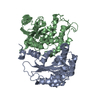
| ||||||||
|---|---|---|---|---|---|---|---|---|---|
| 1 |
| ||||||||
| Unit cell |
|
- Components
Components
| #1: Protein | Mass: 29579.945 Da / Num. of mol.: 2 Source method: isolated from a genetically manipulated source Source: (gene. exp.)  Production host:  #2: Water | ChemComp-HOH / | Has protein modification | Y | |
|---|
-Experimental details
-Experiment
| Experiment | Method:  X-RAY DIFFRACTION / Number of used crystals: 1 X-RAY DIFFRACTION / Number of used crystals: 1 |
|---|
- Sample preparation
Sample preparation
| Crystal | Density Matthews: 2.43 Å3/Da / Density % sol: 49.35 % | ||||||||||||||||||
|---|---|---|---|---|---|---|---|---|---|---|---|---|---|---|---|---|---|---|---|
| Crystal grow | Temperature: 316 K / Method: vapor diffusion, hanging drop / pH: 7.5 Details: 0.1 M Imidazole and 12-24 % PEG 4K, pH 7.5, VAPOR DIFFUSION, HANGING DROP, temperature 316K | ||||||||||||||||||
| Crystal grow | *PLUS Temperature: 18 ℃ / Method: vapor diffusion | ||||||||||||||||||
| Components of the solutions | *PLUS
|
-Data collection
| Diffraction | Mean temperature: 200 K |
|---|---|
| Diffraction source | Source:  SYNCHROTRON / Site: SYNCHROTRON / Site:  CHESS CHESS  / Beamline: A1 / Wavelength: 0.93 Å / Beamline: A1 / Wavelength: 0.93 Å |
| Detector | Type: ADSC QUANTUM 4 / Detector: CCD / Date: Dec 24, 1998 |
| Radiation | Protocol: SINGLE WAVELENGTH / Monochromatic (M) / Laue (L): M / Scattering type: x-ray |
| Radiation wavelength | Wavelength: 0.93 Å / Relative weight: 1 |
| Reflection | Resolution: 1.7→25 Å / Num. all: 62543 / Num. obs: 61981 / % possible obs: 99.1 % / Observed criterion σ(F): 0 / Observed criterion σ(I): 0 / Redundancy: 3.3 % / Rsym value: 0.054 |
| Reflection | *PLUS Rmerge(I) obs: 0.054 |
| Reflection shell | *PLUS Highest resolution: 1.7 Å / Lowest resolution: 1.8 Å / % possible obs: 99.1 % / Rmerge(I) obs: 0.28 |
- Processing
Processing
| Software |
| ||||||||||||||||||||
|---|---|---|---|---|---|---|---|---|---|---|---|---|---|---|---|---|---|---|---|---|---|
| Refinement | Method to determine structure:  MOLECULAR REPLACEMENT / Resolution: 1.7→25 Å / σ(F): 0 / σ(I): 0 / Stereochemistry target values: Engh & Huber MOLECULAR REPLACEMENT / Resolution: 1.7→25 Å / σ(F): 0 / σ(I): 0 / Stereochemistry target values: Engh & Huber
| ||||||||||||||||||||
| Refinement step | Cycle: LAST / Resolution: 1.7→25 Å
| ||||||||||||||||||||
| Refine LS restraints |
| ||||||||||||||||||||
| Refinement | *PLUS Rfactor Rfree: 0.2379 / Rfactor Rwork: 0.2077 | ||||||||||||||||||||
| Solvent computation | *PLUS | ||||||||||||||||||||
| Displacement parameters | *PLUS |
 Movie
Movie Controller
Controller



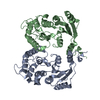
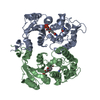
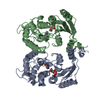
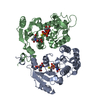
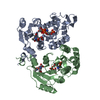
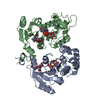
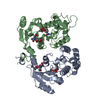
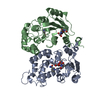
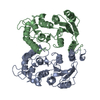
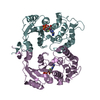

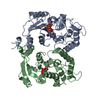
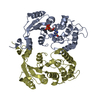
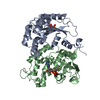
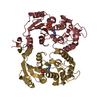
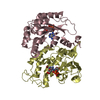
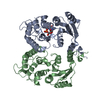
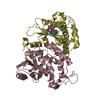
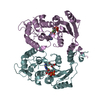
 PDBj
PDBj
